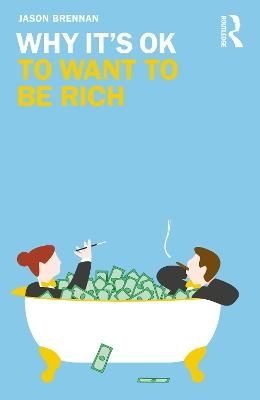
Why It's OK to Want to Be Rich
Seiten
2020
Routledge (Verlag)
978-1-138-38902-1 (ISBN)
Routledge (Verlag)
978-1-138-38902-1 (ISBN)
In Why It’s OK to Want to Be Rich, Jason Brennan argues that It’s OK to get rich and it’s OK to enjoy being rich, too.
Finger-wagging moralizers say the love of money is the root of all evil. They assume that making a lot of money requires exploiting others, and that the best way to wash off the resulting stain is to give a lot of it away.
In Why It’s OK to Want to Be Rich, Jason Brennan shows that the moralizers have it backwards. He argues that, in general, the more money you make, the more you already do for others, and that even an average wage earner is productively “giving back” to society just by doing her job. In addition, wealth liberates us to have the best chance of leading a life that’s authentically our own.
Brennan also demonstrates how money-based societies create nicer, more trustworthy, and more cooperative citizens. And in another chapter that takes on the new historians of capitalism, Brennan argues that wealthy nations became wealthy because of their healthy institutions, not from their horrific histories of slavery or colonialism.
While writing that the more money one has, the more one should help others, Brennan also notes that we weren’t born into a perpetual debt to society. It’s OK to get rich and it’s OK to enjoy being rich, too.
---
Key Features
Shows how the desire to become wealthy in an open and fair market helps maximize cooperation and lessens the chance of violence and war
Argues that it is much easier for the average for-profit business to add value to the world than it is for the average non-profit
Demonstrates that the kinds of virtues (e.g., conscientiousness, thoughtfulness, hard work) that lead to desirable personal and civic states (e.g., happy marriages, stable families, engaged citizens) also make people richer
Argues that living in small clans for most of their history has given humans a negative attitude towards anyone acquiring more than her "fair share," an attitude that’s ill-suited for our market-driven, globally connected world
In a final, provocative chapter, maintains that ideal economic growth is infinite.
Finger-wagging moralizers say the love of money is the root of all evil. They assume that making a lot of money requires exploiting others, and that the best way to wash off the resulting stain is to give a lot of it away.
In Why It’s OK to Want to Be Rich, Jason Brennan shows that the moralizers have it backwards. He argues that, in general, the more money you make, the more you already do for others, and that even an average wage earner is productively “giving back” to society just by doing her job. In addition, wealth liberates us to have the best chance of leading a life that’s authentically our own.
Brennan also demonstrates how money-based societies create nicer, more trustworthy, and more cooperative citizens. And in another chapter that takes on the new historians of capitalism, Brennan argues that wealthy nations became wealthy because of their healthy institutions, not from their horrific histories of slavery or colonialism.
While writing that the more money one has, the more one should help others, Brennan also notes that we weren’t born into a perpetual debt to society. It’s OK to get rich and it’s OK to enjoy being rich, too.
---
Key Features
Shows how the desire to become wealthy in an open and fair market helps maximize cooperation and lessens the chance of violence and war
Argues that it is much easier for the average for-profit business to add value to the world than it is for the average non-profit
Demonstrates that the kinds of virtues (e.g., conscientiousness, thoughtfulness, hard work) that lead to desirable personal and civic states (e.g., happy marriages, stable families, engaged citizens) also make people richer
Argues that living in small clans for most of their history has given humans a negative attitude towards anyone acquiring more than her "fair share," an attitude that’s ill-suited for our market-driven, globally connected world
In a final, provocative chapter, maintains that ideal economic growth is infinite.
Jason Brennan is the Robert J. and Elizabeth Flanagan Family Professor of Strategy, Economics, Ethics, and Public Policy at the McDonough School of Business, Georgetown University, USA. He is the author of 14 books, including In Defense of Openness (2018) and Why Not Capitalism? (2014).
1. The Root of All Evils 2. For the Love of Money 3.Is Money Dirty? Does Money Corrupt? 4. It’s OK to Make Money 5. Rich Country, Poor Country 6. Give it Away Now? 7. Riches, Repugnance, and Remaining Doubts
| Erscheinungsdatum | 23.09.2020 |
|---|---|
| Reihe/Serie | Why It's OK |
| Verlagsort | London |
| Sprache | englisch |
| Maße | 129 x 198 mm |
| Gewicht | 235 g |
| Themenwelt | Geisteswissenschaften ► Philosophie ► Ethik |
| ISBN-10 | 1-138-38902-1 / 1138389021 |
| ISBN-13 | 978-1-138-38902-1 / 9781138389021 |
| Zustand | Neuware |
| Haben Sie eine Frage zum Produkt? |
Mehr entdecken
aus dem Bereich
aus dem Bereich


